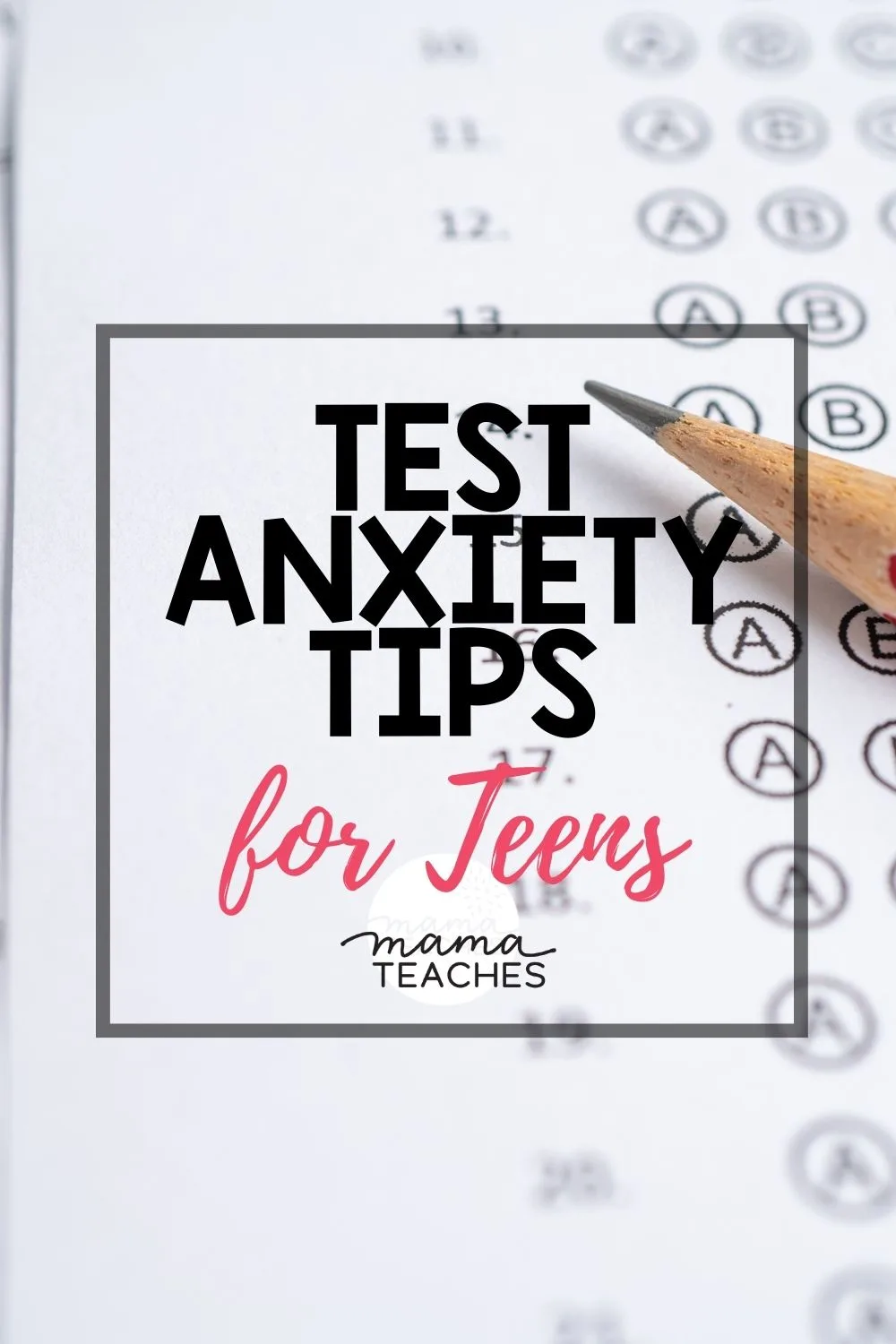How can you help teens minimize test anxiety? Check out these test anxiety tips to sweep the stress away.

What Is Test Anxiety?
Test anxiety is a form of performance anxiety that has physical, emotional, and cognitive symptoms.
Your teen may experience physical symptoms such as rapid heart rate and breathing, trembling, sweating, nausea, and stomach ache.
Emotionally, teens feel overwhelmed, extremely nervous, and irritable.
Test anxiety causes cognitive symptoms such as fuzzy thinking and the mind “going blank.” He may not be able to recall what he knows or use his reasoning capabilities.
For more on test anxiety, check out this article.

This article contains affiliate links to things that you might like.
Managing Test Anxiety in Teens
You can reduce test anxiety with these tips.
Reduce or Eliminate Caffeine
Although caffeine can give your teen a short-term burst of energy, its stimulant effects can make the physical symptoms of anxiety worse (like rapid heart rate, sweating, shallow breathing, etc.).
If your teen typically consumes a lot of caffeine, whittle down their consumption over time. Don’t go cold turkey on test day.
A healthy diet coupled with a protein-rich meal before the test is best.
And drink plenty of water. Dehydration reduces cognitive function and inhibits memory.
So take a pass on the latte and opt for eggs and a bottle of water!
Get Adequate Sleep
This one seems like a no-brainer. But if you need more convincing, proper rest directly affects test anxiety and performance.
Sleep is the body’s reset. Adequate sleep helps the brain keep stress hormones like cortisol in check.
It also improves cognitive function, reasoning skills, and mood regulation.
Staying up late cramming for a test will backfire. Make sure your teen gets at least 8 hours of sleep the night before a test.
Better yet, set a regular sleep-wake routine that ensures adequate sleep every school night.

Prepare for the Test
If it is counterproductive to stay up late cramming for a test, when do you study?
The best preparation is done in manageable chunks over time.
Check out time management apps to help your teen stay on track.
Some of these apps are more schedule focused (like Timefinder and Oh My Schedule!), while others minimize online distractions for intensive studying (like Session or Portal).
Another component of test preparation involves knowing how to study.
Use active learning methods like flashcards, teaching a study partner, and summarizing.
Utilize study guides from the teacher.
If possible, take mock tests on the material (this is especially helpful if you know the test format).
Talk to Someone
If your teen is experiencing test anxiety, it may help to express his feelings to a trusted advisor like a parent, teacher, counselor, or friend.
Even the act of confessing your feelings of anxiety can reduce anxiety in some cases.
It is also helpful to pinpoint if the teen is under a lot of pressure at home or school. This can exacerbate feelings of anxiety.

Practice Deep Breathing
Here is one of the test anxiety tips for test day.
Deep breathing can slow heart rate and regulate breathing.
This eases the physical symptoms of test anxiety, which in turn can help the cognitive and emotional symptoms.
Deep breathing needs to be taught and practiced.
One technique involves sitting with one hand on your abdomen and one hand on your chest.
Take a deep breath that raises the hand on your abdomen but does not raise the hand on your chest. Expel the air and repeat.
Another technique involves breathing in through your nose for a count of two.
Then purse your lips as if you are going to whistle and expel the air for a count of four. Repeat.
Deep breathing is the gateway to mindfulness and meditation, both of which ease test anxiety.
Use an App
Apps can also help your teen relax before a test.
Endel uses AI to generate soundscapes to fit the occasion: rest, relax, or focus.
Calm has nature sounds, guided meditations, and breathing exercises.
Headspace offers specific programs to reduce anxiety.

Stay Positive
Anxiety amplifies the negative voice in your teens head that tells them they are stupid or a failure.
They must learn to counteract the negative voice with positive affirmations.
For every negative thought, replace it with a positive one (your can use a growth mindset quotation).
For example, if your teen starts thinking, “I can’t do this! I can’t remember!” she must tell herself, “I prepared for this test. I can meet these challenges.”
Use Audio/Visual Cues to Calm Down
Just as soundscapes can help relax your teen and ease test anxiety, a playlist might do the same.
As he is walking to class, play a song that gets him in the right headspace for test taking. That is different for everyone.
Or he could watch a funny video (especially with a friend). Laughter is an instant stress-reducer.
He can use visual cues to relax as well. Picture a place that he finds relaxing and focus on that in his seat before the test begins.
He can also visualize himself doing well on the test and answering the questions with confidence.

Test Taking Tips for Teens
These test anxiety tips will help your teen prepare and perform his best on tests.
Remember, the goal of a test is to assess what a teen actually knows.
By minimizing test anxiety, you give your teen the chance to show his knowledge and skill.
